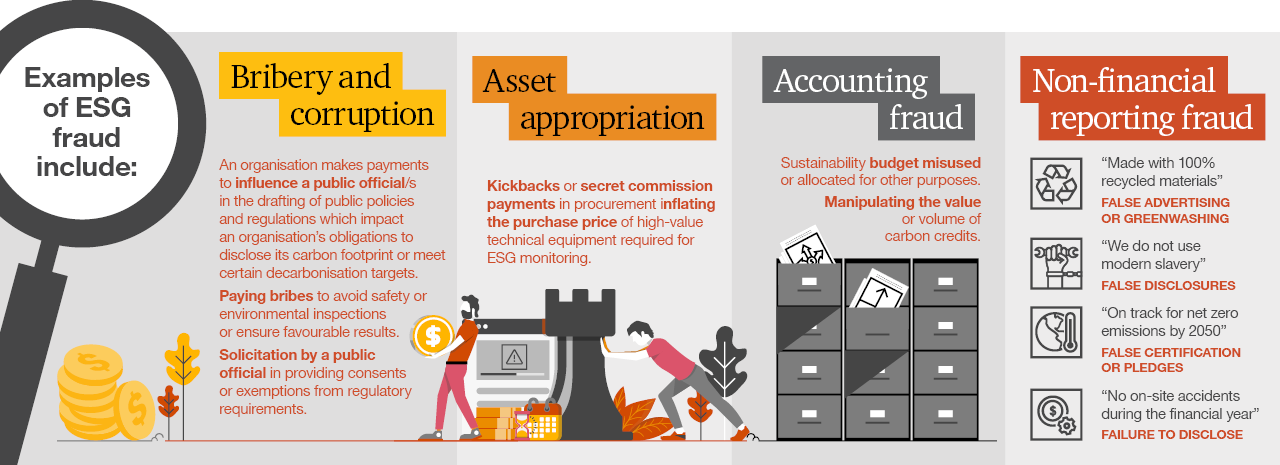{{item.title}}
{{item.text}}

{{item.text}}
We have pulled the results into five separate summaries covering the key takeaways from the latest data. Part One: Economic crime is increasing, but are you surprised? provides a summary of the main survey results and shares the top level insights. Part Two: Fraud in a Pandemic: What do the numbers tell us and should we be concerned? examines the effect of COVID-19 on fraud and the changes organisations experienced as a result of the pandemic. Part Three: Fraud is out there, but who is behind it? focuses on the types of perpetrators that are the most disruptive for businesses and the potential financial impact of this disruption. In this fourth summary, we look into the emerging threat of ESG fraud, focusing on what ESG fraud is, how it manifests and what you can do to stay ahead of it.
Just over a third (37%) of global respondents recorded that a general lack of understanding of what ESG means and what it might mean for their organisation is one of their greatest challenges in managing ESG risks. Understanding the potential opportunities and threats from ESG is the critical first step.
Environmental, social and governance (ESG) describes non-financial factors that influence how stakeholders (e.g. investors, lenders, workers, donors and consumers) engage with an organisation.
Environmental factors focus on how organisations establish goals and objectives to safeguard the natural environment. This may include corporate policies addressing climate change, for example.
Social factors consider how an organisation manages its relationships with people to consider matters such as diversity and inclusion, equity, social justice, and working environments. An organisation's social policies may extend to consider not only employees, but also suppliers, customers, and the communities where it operates.
Governance deals with an organisation’s ethics such as transparency, audits, internal controls, leadership behaviour and executive pay.
Previously, stakeholder decisions have relied heavily on financial performance, however, ESG is now one of the key considerations for many stakeholders.
8% of organisations who encountered fraud experienced ESG reporting fraud. Although currently this represents only a relatively small component of the overall fraud landscape, this is only going to grow as requirements increase for organisations.
ESG fraud is an emerging fraud risk which refers to falsifying ESG factors by reporting false or misleading ESG information, omitting ESG facts or making improper ESG disclosures. ESG fraud can be perpetrated internally (i.e. by management or employees) or externally (i.e. by vendors, contractors or customers). An organisation may depend on activities conducted by third parties to achieve targets, or may rely on third parties to monitor and attest to achieving targets, however it is important to ensure you can rely on third parties to assist with meeting your ESG obligations.
We know that fraud is more likely to occur where three elements are found together - opportunity, incentive/pressure and rationalisation - collectively known as the ‘Fraud Triangle’. The prevalence of all three elements in current economic context creates an environment ripe for ESG fraud:
Click on the tabs below to learn more:
ESG regulation and guidance is limited but growing, and the requirements and standards for reporting are being defined. This means that there is limited guidance on the expectations of ESG reporting or benchmarks for comparison. In this context, for many organisations there is less certainty and comfort around what ESG disclosures are required, what systems and data are available to meet those requirements, and how effective are the controls in place to ensure the availability and accuracy of that data. Taken together, this elevates the opportunity for fraudulent ESG claims.
As ESG responsibility becomes more important to stakeholders, there is growing pressure on senior leadership to set and achieve ESG goals, and pressure across the organisation to achieve them. 87% of global respondents are at least slightly concerned about achieving internal ESG targets and over 10% reported that their organisation does not currently have the necessary data for ESG reporting. This creates the pressure to demonstrate ESG goals through misrepresentation.
There may be differing opinions on the significance of ESG goals, and there can be a perception that somehow these goals are different from “harder”, financial metrics. Misrepresenting or falsifying ESG information or disclosures may seem victimless or justified by being less important, especially where falling short of ESG goals can cause serious damage to an organisation’s financial position, reputation and compliance.
As ESG matters gain influence, the incentive to commit fraud in this area will continue to increase - and, as regulators, lenders, investors and consumers pay closer attention, so will the consequences.
Over 65% of global organisations reported that they are investing in people, processes and/or technology to enhance their ability to accurately report ESG metrics.
Faced with the difficulties of ensuring accurate measurement and reposting of ESG requirements, organisations globally are investing to ensure they are appropriately reporting their ESG requirements. This is particularly important from a fraud perspective where, historically, there may have been the opportunity to falsify ESG metrics without the fear of much scrutiny or standards to be measured against.
Additionally, over 60% of respondents are leveraging technology to monitor and track ESG metrics. As we have seen in previous parts of this series, technology plays a big part in new and emerging fraud trends, and ESG is no different. In fact, as nascent ESG requirements continue to emerge, the opportunity exists now to build monitoring technology into the measurement and reporting systems.
Lastly, 68% of global respondents reported that they agree or strongly agree with their organisation’s ability to track current changes to regulations related to ESG. This is a positive step forward in monitoring accountability and ensuring that organisations are abiding by global standards.
Earlier this year, the New Zealand Government was the first country to pass legislation mandating climate-related disclosures for publicly listed companies and Large Financial Market Conduct (FMC) entities. The climate-related disclosures framework is currently being developed by the External Reporting Board (XRB) based on recommendations from the Task Force on Climate-related Disclosures. It will require organisations to assess risks and opportunities of climate to their business across four different pillars:
Governance
Strategy
Risk management
Metrics and targets
The Government has also introduced the Crown Responsible Investment Framework, issued to the Crown Financial Institutions (CFIs), made up of the NZ Super Fund, ACC, Government Superannuation Fund and National Provident Fund. The framework requires the institutions to transition their portfolios and commit to net zero emissions by 2050. This will align investment decisions to reflect the Government’s goal of a carbon neutral New Zealand by 2050.
40% of global respondents reported that their organisation's greatest challenge in managing the risks associated with its ESG targets and reporting requirements was the inability to accurately monitor or report ESG metrics within their organisation.
We are seeing a surge of businesses making net-zero commitments, locally and globally. Today 90% of the global economy falls under a net zero pledge, up from just 16% in 2019 (PwC Time to get serious about the realities of climate risk). Ethical investing is also increasing in popularity and investment funds are making ESG commitments as consumers are expecting more transparency around where their money is invested.
However, research by the Financial Markets Authority (FMA) found that while there is growing popularity of ESG investments, investors find it difficult to make informed decisions. The research identified the need for the industry to provide accurate, quality information to explain and support ESG claims.
Following on from the research, earlier this year, the FMA conducted a review of 14 KiwiSaver and other managed funds claiming to be ESG-oriented (e.g. ethical, responsible or sustainable), to establish how well they are applying the FMA’s integrated financial product guidance.
The key findings of the review were:
It is difficult for investors to make decisions as relevant information is lacking - the level of detail and clarity about ESG approach needs improvement.
Investors are not given information about what ESG funds exclude and why - fund managers should clearly disclose what investments are excluded and why.
Funds are failing to explain the risk and return of ESG investments - fund managers need to adequately explain the financial performance implications of integrating ESG into investment decisions.
Funds do not set out any consequences for failing to achieve ESG outcomes - fund managers should explain what will happen if it fails to deliver on its ESG intentions.
Do focus on your fraud risk governance. Establish a tone at the top which communicates the importance of ESG controls and reporting. Make sure you have defined roles and responsibilities in relation to any ESG programmes and disclosures.
Don’t forget your segregation of duties. Multiple levels of oversight and reviews make it more difficult for staff to manipulate figures.
Do conduct ESG fraud risk assessments, or, at the least, include ESG components into your current fraud risk assessments.
Don’t just focus your efforts internally. Make sure you have good oversight over your third parties and apply your fraud risk assessment over your entire supply chain.
Do establish Key Performance Indicators (KPIs) and Key Risk Indicators (KRIs) for your ESG fraud risk programme.
Don’t create unintentional incentives. Avoid linking remuneration or other benefits to ESG progress, as this can unintentionally incentivise ESG fraud schemes.
Do implement robust policies, procedures and internal controls which focus on ESG. Leverage data analytics and automated reporting to ensure your disclosures are transparent and free from manual manipulation.
Don’t assume your staff will already know about ESG fraud risks. Instead, incorporate ESG into your staff training and awareness programmes.
Do ensure you have systems and data to accurately report on the achievement of those requirements/promises.
Don’t intentionally report incorrect or inaccurate ESG statistics.
PwC’s Forensic Services team uses global methodology to help clients to build trust and closely manage the risks associated with business fraud, financial crimes and other irregularities. Our Forensics Services team provide the following services:
Forensics Investigations
Digital Forensics & Incident Response (DFIR)
Anti-Money Laundering, Countering Financing of Terrorism, and Sanctions compliance
Forensic Accounting
Fraud Prevention, including maturity and risk assessments
Protected Disclosure and Whistleblower Services
{{item.text}}

{{item.text}}








